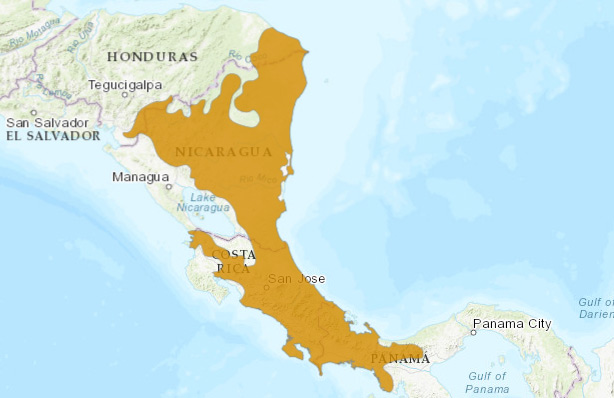Olingo
Bassaricyon gabbii
©Ricardo Cavani
Taxonomy
Standard English Name
Olingo
Scientific Name
Bassaricyon gabbii
Brazilian common name/s
Olingo, Jupará
Conservation status - IUCN
Physical Description
As its Brazilian common name indicates, this species is often confused with the Kinkajou (Potos flavus), as the habits of the two species are very similar. Olingos are almost entirely arboreal, and are very agile in trees, although they do not have a prehensile tail like the Kinkajou. Its dense coat has a brownish colour, with a creamy-yellow belly, which distinguishes it from the Kinkajou. It has a body length of approximately 40 cm and a 47 cm tail that has dark rings, which are sometimes incomplete.
Ecology and Habitat
It occurs mainly in the west and northwest of the Amazon.
It is a generalist species, feeding mainly on fruit, insects, small vertebrates and pollen.
Little is known about its reproductive biology in the wild. In captivity, a single young is born after a gestation of about 72 days.
Threats and Conservation
Apparently it is only threatened by the alteration and destruction of its forest habitat.
Online links
IUCN redlist (http://www.iucnredlist.org) presents a synthesis of current knowledge about distribution and conservation status.
References
Emmons, L. H., & Feer, F. (1997). Neotropical rainforest mammals: a field guide. Chicago: University of Chicago Press.
Kays, R. W. (2000). The behavior and ecology of olingos (Bassaricyon gabbii) and their competition with kinkajous (Potos flavus) in central Panama. Mammalia, 64, 1-9.
Koepfli, K. P., Gompper, M. E., Eizirik, E., Ho, C. C., Linden, L., Maldonado, J. E., & Wayne, R. K. (2007). Phylogeny of the Procyonidae (Mammalia : Carnivora): Molecules, morphology and the Great American Interchange. Molecular Phylogenetics and Evolution, 43, 1076-1095.
Pontes, A. R. M., & Chivers, D. J. (2002). Abundance, habitat use and conservation of the olingo Bassaricyon sp in Maraca Ecological Station, Roraima, Brazilian Amazonia. Studies on Neotropical Fauna and Environment, 37, 105-109.
Reid, F., & Helgen, K. (2008). Bassaricyon gabbii. In: IUCN 2010. IUCN Red List of Threatened Species. Version 2010.2. <www.iucnredlist.org>, , Downloaded on 04 July 2010.
